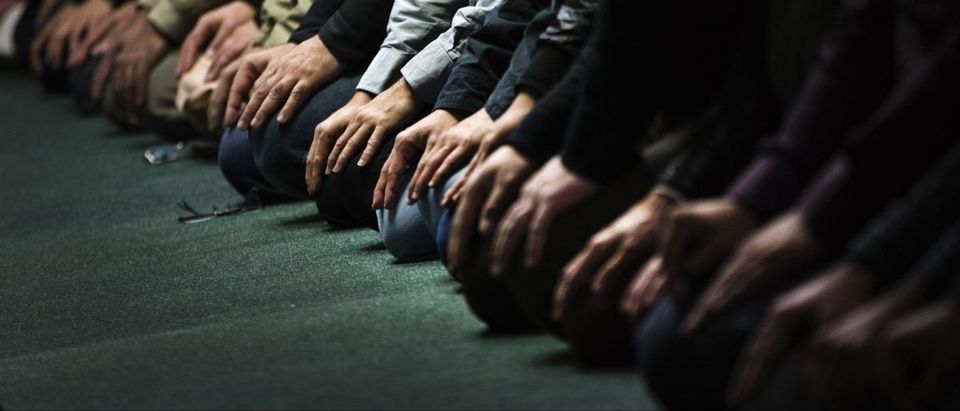I was less offended by the imam of the Davis, California Islamic Center calling for the annihilation of the Jews than by his subsequent and meaningless apology encompassed in a photo op with members of the Jewish community heaping praise on the imam’s contrition.
In calling for the annihilation of the Jews, the imam was being true to his interpretation of his faith. He was accurately quoting the Koran, doing what fundamentalist imams all over the world, from Iran to Gaza to even Switzerland and Riverside, California, routinely do. There was nothing distinctive about his sermon.
Why should a fundamentalist Muslim be pressured not to be a fundamentalist Muslim? Do fundamentalist Muslims intervene in rabbinic sermons in synagogues?
Fortunately for the imam, Islam enables him to indulge in Taqiyya, where Muslims can speak falsely if it advances the faith.
Islam took the world by the sword, just as medieval Christianity did, and as Judaism did when Joshua emerged from the desert and stormed the strongholds of Canaan. But Judaism and Christianity have evolved, and so too, when given the opportunity, as in America, has Islam. Muslim reformers just don’t make for exciting news. Fundamentalists who lacerate our sensibilities do.
The imam at Davis says he got caught up in the moment, but the anti-Jewish screed lasted an hour. Perhaps the entourage at Wannsee that planned Hitler’s final solution merely got caught up in the moment. Too bad they didn’t use that as a defense at Nuremberg.
If any rabbi presented such a sermon about Islam, he would be shouted down, and if he persisted, the congregation would walk out on him. But at the Islamic Center in Davis, no one shouted an objection and no one walked out. In fact, when the sermon became controversial, the congregation doubled down in support of the imam.
All religions go through periods where they rediscover their fundamental roots. They turn inward. Turkey is a prime example. Joining the rise of Islamic fundamentalism sweeping the region, Turkey has become repressive. It’s Western-oriented intellectuals and opposition journalists now populate its prisons, with 231 journalists arrested in the last year alone.
As with the rise of any fundamentalist religion, fundamentalist Islam creates internal cohesion by outward aggression against the non-believer.
Although minorities seldom flourished under Islamic supremacy, despite the mythical re-creation of Andalusia, the rise of fundamentalism has made the plight of minorities even worse. Christians are being forced out of the Islamic Middle East, as Jews were decades ago. Bethlehem is no longer a Christian city. In Sub-Saharan Africa, Boko Haram and ISIS annihilate Christian communities, and ISIS atrocities in Syria and Iraq need no further commentary.
America is peppered with Muslim reformists, but their names are eclipsed by the publicity generated by the fundamentalists. CAIR, an unindicted co-conspirator in the trial of a terrorist front organization, is the go-to organization for the media on issues related to the Islamic community.
The names of the reformers are seldom mentioned. Their calls for an Islam based on humanism, rooted in centuries of scholarship, is not as newsworthy as the latest act of fundamentalist violence or verbal outrage. But reformers exist and occasionally even makes it to the mainstream media. One prominent Islamic philosopher who inspires reform is the Egyptian scholar Nasr Abu Zayd.
He argued that the Koran was a “cultural product” that had to be read in the context of the language and culture of the seventh century Arabian Peninsula, and could be interpreted in numerous ways. He also criticized the use of religion as a basis for political power. In 1995, an Egyptian court declared him an apostate and ordered him separated from his wife. Still, his ideas could not be extinguished.
Abu Zayd’s ideas can be found in the foundations of the Muslim Reform Movement, which is dedicated to reforming Islam through values of peace, human rights, and secular government. Founded on December 4, 2015, the movement’s organizers read a “Declaration of Reform” at the National Press Club in Washington, D.C., and then went to the Saudi-affiliated Islamic Center of Washington and posted the declaration on the doors of the center “denouncing violent jihad, rejecting Islamic statism and opposing the ideology of violent Islamic extremism.” Among its founders are Zuhdi Jasser and Salma Siddiqui.
While Islamic reform movements are few in number and generally shunned by the majority of Muslims, it is only through movements like these that align with Western values that Islam can find a meaningful and non-threatening place in America.
Rather than try to mold radical Muslims into something they are not, we should be reaching out to the reformers. Unless they are the future, there is little hope for either the Muslim community or the larger one in which it finds itself.
Abraham H. Miller is an emeritus professor of political science, University of Cincinnati, and a distinguished fellow with the Haym Salomon Center. Follow him @salomoncenter


